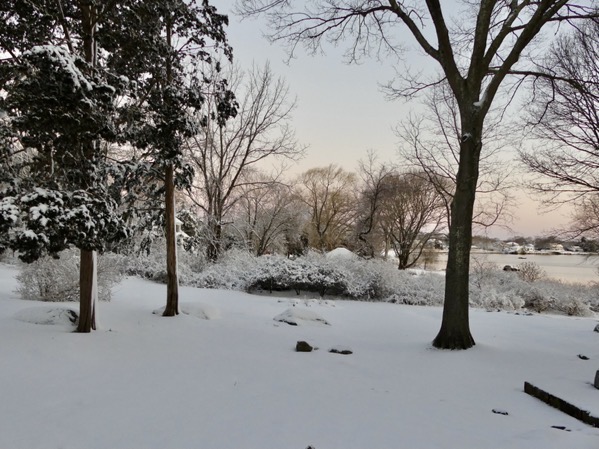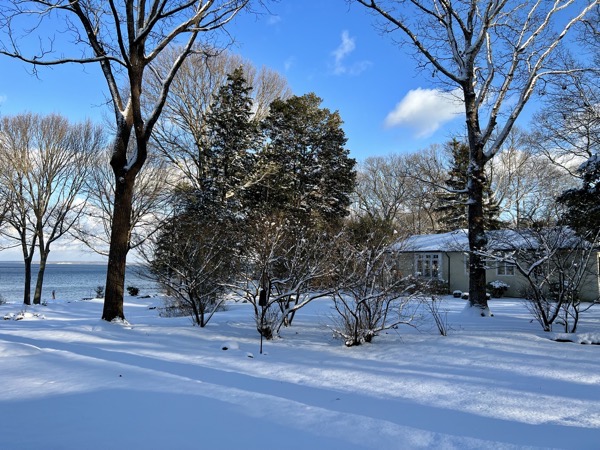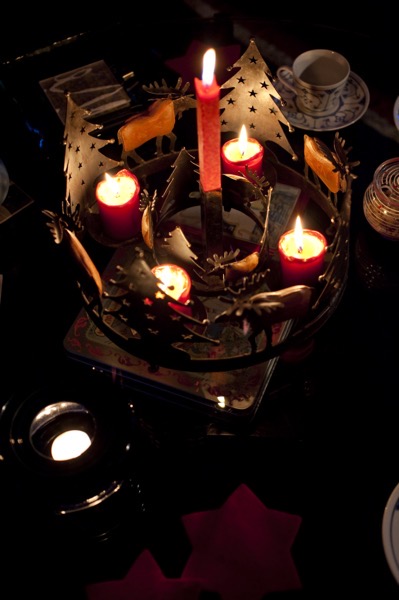The Bishop’s Reading List – early summer 2023
The Bishop’s Reading List
For your summer reading enjoyment, we are introducing The Bishop’s Reading List, a new, occasional feature with links to articles and other online materials that Bishop Nicholas has been reading.
This week, smart home technology as a path to energy independence; a new religious charter school in Oklahoma; the Catholic Church’s history of profiting from slavery (which we share as Episcopalians); and a woman who, quite literally, bought a mountain in northwestern Pennsylvania for God—and a far-right Christian movement called the New Apostolic Reformation.
Home, smart home (The Verge)
Oklahoma Approves First Religious Charter School in the U.S. (New York Times)
The Catholic Church profited from slavery — ‘The 272’ explains how (NPR)
The Woman Who Bought A Mountain for God (The Atlantic)
Convention Address 2022
At our Diocesan Convention on November 5, the Bishop spoke about the need to identify and uplift younger leadership. Watch his address here.
Kept the good wine until now…
 To my mind, there are two key takeaways for us this week. We who are Christians stand in the crowd of witnesses that began with the first stories, with Abraham, Sarah and Hagar, with the family of Abraham, with Joseph, Moses, Joshua, Deborah, Ruth, Samuel, Saul and David, and all the prophets.
To my mind, there are two key takeaways for us this week. We who are Christians stand in the crowd of witnesses that began with the first stories, with Abraham, Sarah and Hagar, with the family of Abraham, with Joseph, Moses, Joshua, Deborah, Ruth, Samuel, Saul and David, and all the prophets.
We remember what they longed to see. We are gathered and transformed by what happened just as they were created and transformed by what they were promised.
And standing in that crowd, being given the story that unlocks the deepest meaning of all the stories, it is our turn to share them with our children and our neighbors. They too, whether they know it or not, are being remade by the working of the same Spirit.
His winnowing fork is in his hand… a sermon for the First Sunday in Epiphany
 To us has been given the Word of truth, the Word of faith and of hope. So that even in this moment, as the nations roar and creation groans, we see the working of the Spirit to bring all to perfection.
To us has been given the Word of truth, the Word of faith and of hope. So that even in this moment, as the nations roar and creation groans, we see the working of the Spirit to bring all to perfection.
Do not wonder then but behold the working out of Salvation in our midst. It is being made manifest to us. And how appropriate today that the name of this liturgical season, Epiphany literally means manifestation.
So what should we do in day like this? Care for one another. Care for the people in our lives. Care for the world as best we can. But also know that God is working in us as individuals and in all us as part of God’s created order.
The winnowing fork and the wind are separating the good parts from the bad. Thanks be to God.
Advent 2021 reflection
 The past few years have felt like a movie plot that keeps tossing up complications just as you think the journey home is ending. We believe we are getting back to normal, and another variant appears; first delta and then omicron. We think one round of vaccination will end the pandemic, and now we need additional shots. It’s exhausting and, on some days, even disheartening.
The past few years have felt like a movie plot that keeps tossing up complications just as you think the journey home is ending. We believe we are getting back to normal, and another variant appears; first delta and then omicron. We think one round of vaccination will end the pandemic, and now we need additional shots. It’s exhausting and, on some days, even disheartening.
But as public health officials keep saying, there are many reasons to be optimistic. We are in much better shape to manage a viral variant now than we were two years ago. We know much more about COVID, how to mitigate its spread, and how to treat it when people develop symptoms. In big ways and lots of small ways, we’ve made progress. It’s frustrating that it’s not over yet, but frustration is a much better place to be than to be helpless and without options.
History is that way too. Bp. N.T. Wright in his book “Surprised by Hope,” offhandedly remarks that because of Our Lord’s Passion and the working of the Holy Spirit in the world, history has a direction and a purpose to it. Things are happening in the world, and while moral progress and transformation can be frustratingly slow, when you step back, it is breathtaking to see how far we have come. History is moving us to a moment when heaven and earth will be joined together, and all the pain in this world will finally end.
Advent is the time of year when that hope is foremost in our prayers and our hearts. This quiet, dark time at the end of the year is a season for us to look for the quiet, constant work of the Spirit in history. We remember that Heaven surrounds us and that Jesus is at work, binding up the wounds of Creation and releasing us into a new life we cannot yet see but to which time will soon deliver us.
Bishop’s Message – What Comes Next?
Easter 2020
Our Bishop, The Rt. Rev. W. Nicholas Knisely, has recorded this message for Easter.
Bishop Knisely’s 2019 Easter Message
Christ is Risen! The Lord is Risen Indeed! Alleluia! And because he lives, everything in the universe is re-made and exists now in the light of God’s presence. This video presents my reflection for this Easter.
From the Bishop: A difficult conversation for the House of Bishops (Mar. 20, 2019 e-news)
I am just back from the semi-annual meeting of the House of Bishops. One of the topics on the agenda was to respond to the Archbishop of Canterbury’s invitation to all Anglican bishops and spouses to attend the 2020 Lambeth Conference, with the special provision that same-sex spouses of bishops not attend.
At the time it was announced, in the Episcopal Church this only affected Bishop Mary Glasspool and her spouse Becki. But the Diocese of Maine has just elected the Rev. Thomas Brown, and his spouse Tom will also be uninvited. And it is possible there may be more bishops elected in the coming months who also will be married to people of the same gender, and their spouses would not be invited, either, in the name of maintaining the unity of the Anglican Communion.
It was a hard conversation. The members of the House of Bishops are not all of one mind about same-sex marriage, but that is not what made it hard. What is difficult is that, as someone said, we are one church, and by not inviting part of the church we are all diminished. Bishops on all sides of the conversation about marriage spoke of the pain it is causing for us to not all be allowed to attend, much less feel welcomed. I was very much taken by Bishop Mary’s words (and Becki’s words) to the House of Bishops. She acknowledged the pain that the Archbishop’s decision has caused but also reminded us that the Way of Love is also the Way of the Cross. Part of our vocation as followers of Jesus is to do the hard things that we believe are the right things to do.
In this case, the House of Bishops intends to do two things. First, we intend to have a conversation about this with our spouses. They have their own ministries — they are not accessories to Episcopal ministry. Karen and other spouses of clergy in the Episcopal Church have roles to play. They will decide for themselves what they wish to do. The plan is to have a working group of bishops and spouses prepare a process for all of us to use to discuss the next steps. This discussion will take place at our scheduled meeting of the House of Bishops and Spouses in Minneapolis this fall.
The second thing we intend to do is to go to the Lambeth Conference and participate as fully as possible. As Bishop Mary reminded us in her address, “when you are on the menu, you should be at the table.” I believe this Lambeth Conference will be an opportunity for us, for me, to share the stories of ministry and service in which the entire body of the Episcopal Church in Rhode Island participates. Karen and I will be attending the conference and sharing what God is up to here in Rhode Island. I hope you will be proud of what we will do to represent your ministries to the people of the wider Communion. And I hope you will join me in prayer in the months to come for all the people who will be attending the conference – and those who have been asked to not attend. We are one Church, together walking the Way of Love.
+Nicholas
The Bishop’s message for Lent 2019
“Very truly, I tell you, unless a grain of wheat falls into the earth and dies, it remains just a single grain; but if it dies, it bears much fruit.”
 John 12:24
John 12:24
I’m starting to look at the yard at May House. The squirrels have done a good job on it, burying the acorns and then digging them up. I’m always amazed they can find them. I suppose it’s a survival issue for them – and it’s just an annoyance issue for me. Given that they can’t lose sight of what they have set aside, it’s not surprising that they manage to find them again.
The squirrels know they have to put what they need to prosper into a time of quiet and hiding. Doing that lets them keep going when there’s little else to sustain them. I wonder if the world could recognize our work in the Lenten season to be something similar. Perhaps we’re the food being hidden away on the world’s behalf so that the world can keep going when there is nothing else to sustain it.
Lent is that time when we fall to the ground, when we enter into the quiet sleep of late winter in preparation for the bursting forth of new life in springtime. We aren’t doing that just to keep ourselves alive, but so those around us, who depend on us, can trust that we will be there for them. It reminds me of the safety drill on an airplane. “Put your oxygen mask on first, then you’ll be able to help those who need help”.
Take Lent seriously this year. Take on the focus and the discipline, the quietness and the austerity, so that you too can be ready to bear life when the world needs us to do that. You are a blessing to the world when you can care for others because you have cared for yourself.


